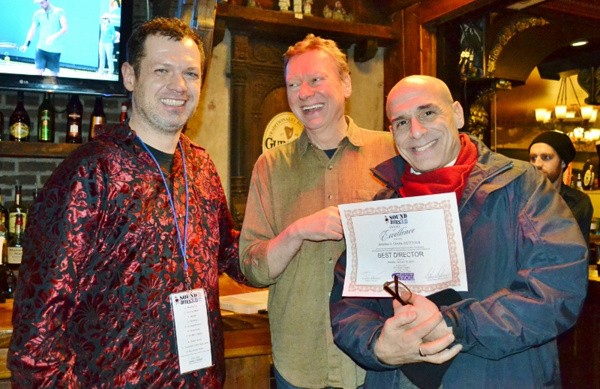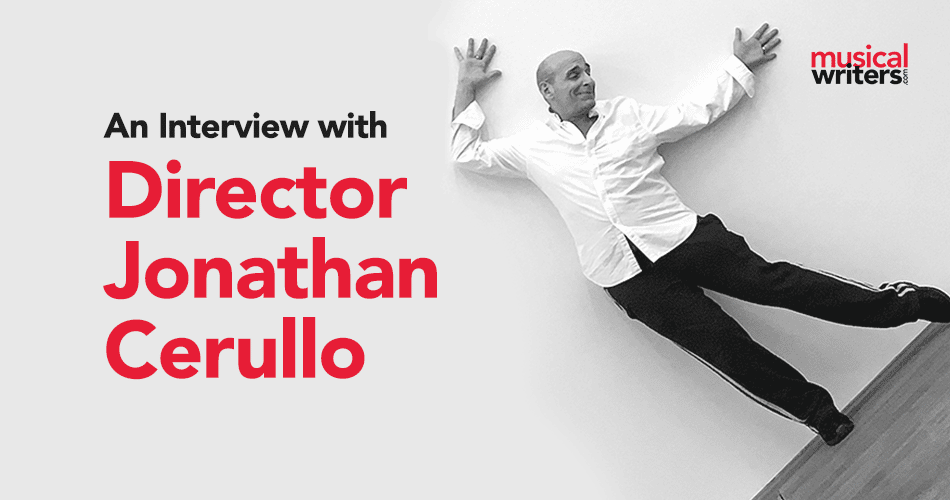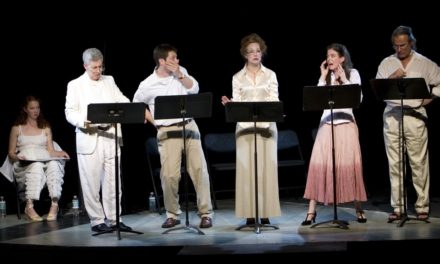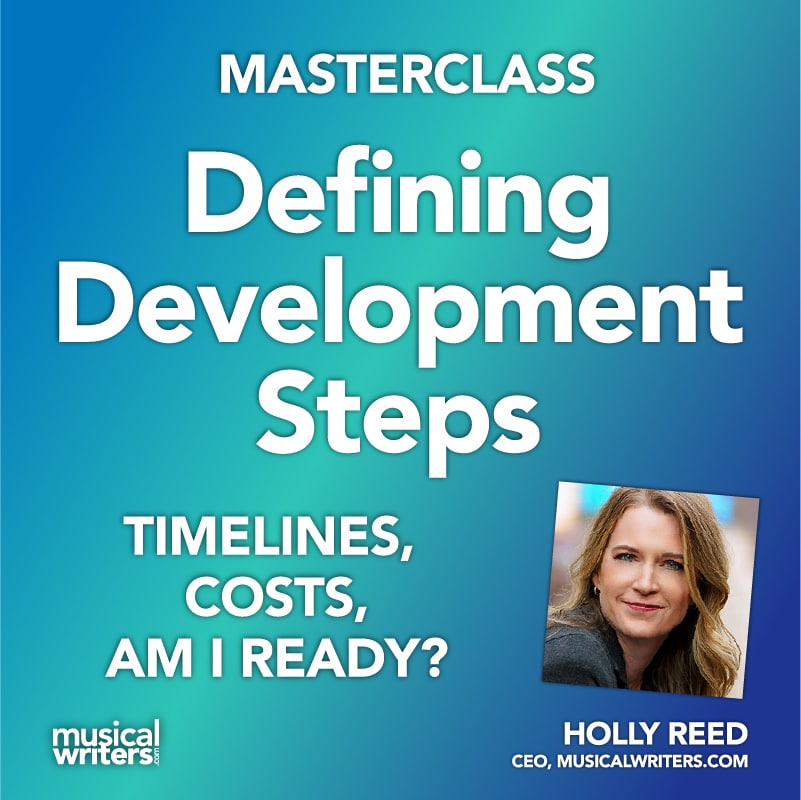For director, executive producer, and choreographer Jonathan Cerullo, presenting a new musical involves clear communication with the show’s authors. He has made this part of his approach to the dozen or so new musicals that have filled his work schedule for the past five years. A member of the Stage Director and Choreographers Society, Cerullo has often been tapped for readings, festival showcases, and event production. He recently won best director’s award for the musical Ficticious at Sound Bites, an annual ten-minute musical festival at Theatre Now in New York City.
I met Jonathan at Sound Bites and interviewed him about how freelance directors work with musical writers.
Connecting with writers
Carol de Giere: At what point do you usually connect with the authors of a show?
Jonathan Cerullo: Very early on. If a project comes to me and it’s never been produced before, one of the things I like to do is establish a timeline and determine the expectations. If they need dramaturgical work, then that’s a few months of devoting time to that. Or if we both feel that there’s not much dramaturgy that needs to be done because it’s already gone through a few readings, then of course that changes the dialogue. Then we talk about casting, schedule, budget, etc. It depends on where the writer is and where the work is within its development.
New Musical Readings
CD: Do you try to organize a reading if that hasn’t been done?
JC: I always recommend a reading. As we know, novels are meant to be read and musicals are meant to be seen and heard. Readings are part of the process, whether a private reading around someone’s dining room table or something more formal like an actor’s equity sanctioned 29-hour reading. It allows the composer, librettist, and lyricist all to hear the work articulated by an actor, which is what we all need to have happen.
CD: Is it the director’s job to gather the rest of the team of the show, and what does that involve?
JC: At the reading stage, it’s up to the director to recommend a casting director. I always recommend they use a casting director, otherwise the director becomes the casting director and if you’re casting large musicals of more than eight to ten people, it can become unwieldy. I have several casting directors that I’ve worked with.
The director can also recommend actors they know and have authors look at their websites or videos. You’re not getting into production design, so you don’t need to worry about creating that team, but you do have to deal with finding rehearsal space. I make recommendations to the author about space and set up a specific 29-hours schedule that includes the performance itself. I also consult on how to advertise, marketing, press, etc.
CD: It’s a big package.
JC: It can be a big package. So I always want to be sure I work with an author and say, let me give you full transparency here. It’s going to require this specific work to get the show in front of you and your colleagues. Readings are mainly intended for the authors to hear their material read and sung out loud. This is the focus and the specific intention for developmental musical readings.
Casting
CD: How do you feel about writers having casting preferences?
JC: It would be silly if they didn’t have them. I always say to them, “Tell me, in our modern culture, who is the prototype of the actor you’re looking for? Is it Robert Downey Jr. as opposed to Robert De Niro? They might say, ‘Oh, it’s a Bobby De Niro part, it has that kind of feel and stature.’ I say, Okay, great, now I know.” Then it’s the responsibility for the casting director and director to have that dialogue.
I always say….Tell me, in our modern culture, who is the prototype of the actor you’re looking for? Is it Robert Downey Jr. as opposed to Robert De Niro?
~Jonathan Cerullo
I like it when a director can write a character description and then it’s approved by the playwright. Then either you hold auditions or most often with readings, it’s just “ask only.” Then it comes down to schedule, which is the most difficult part – to get their schedules together. Also the director should come in with people, as I mentioned earlier. You begin to gather your team.
CD: Do you use character descriptions in an audition notice?
JC: Yes, absolutely. We call that a character breakdown. I like to make up my own character breakdown and show it to the author. Sometimes the author already has those character breakdowns delineated. You collaborate with the playwright, and casting director to post the casting notices.
CD: Who has the final say?
JC: That’s a catch 22 question. The writer will always have final say. We only hope that the writer and director are in cahoots and everybody is satisfied with the person they are casting and there’s no question, but there are times when a writer will have in their contract, final casting decision is on the author, when you get to that level. I’ve run into situation when it hasn’t been seen eye to eye and you have to work through that.

Jonathan Cerullo receives director award at Sound Bites
Festival Showcases
CD: Let’s switch scenarios. Let’s say you’re going to direct a five-performance festival showcase. Is the director responsible for a bigger team?
JC: Yes, because then you’re dealing with production design elements: sets, costumes, lights, props, sound, and perhaps video. You’re getting closer to a fully realized production as opposed to a reading. With a reading there are no costumes or props. With a staged reading you can have minimal choreography and minimum staging, but it’s not realized any further than that. When you get into a showcase, then you’re articulating it in a complete different fashion so the director is responsible for a much larger picture. And that’s also the time for the director and choreographer, along with the authors, to see how the show looks and feels. How does it move, what’s the vocabulary of the staging, what does the production want to look like: is it paper, is it metal, is it glass? That’s a way to start opening up that storytelling.
CD: Do you recommend taking a show to NYMF? And do you feel that writers should have lots of readings before they invest in a NYMF show?
JC: First I would say it is an investment; there is no question about that. You have to be ready to put down some serious money. I’ve heard $30,000 as a figure. I do suggest that a work goes through two or three musical readings beforehand, perhaps even a workshop.
Building a Show’s Resume
CD: Do you also see many shows where there are a few productions and they don’t know what to do? What advice do you have for writers in that situation?
JC: “Keep trying, and know when to stop!” is what I say. Know when to not put any more of your own financial resources into a work that is not gaining traction. There are so many outlets for authors to have their work done. It’s not just New York; there is a whole country out there that has festivals and grants and writing programs. The Dramatists Guild is an incredible resource for that and I strongly urge writers to join.
CD: I’ve heard it’s important for a show to build its resume, so that whoever will produce it sees that it has a track record.
JC: Absolutely. Track records are very important. So if you have history of the development process, it vets the piece, first of all, especially if you’ve had a reading at recognized organizations or just an organization that comes with its own cache. But some theatres won’t do a show because it has been done somewhere else. They want to do the premiere, so that if it is a big hit they can have their name attached: originally produced at their theatre. It can work both ways.
Communication
CD: Do you have any advice for writer-director communication?
JC: I think it is full transparency. There are times when I go into a situation and I’m very up front with an author and ask, “Do you want me to work with you dramaturgically on this and make suggestions or offer input?” Most of the time they say, “Yes, I love that.” Sometimes it doesn’t work out that way. Sometimes they put a fence up and I call it their “Do Not Enter” sign. And you’ll know that immediately and you will either work through that situation or not. The playwright, in my opinion, should have final say. They are the ones who created the piece. I am a gun for hire as a director. I will often say, “I don’t agree with that but I will put it forward; let’s try it.” Sometimes it works and sometimes it doesn’t. It’s all a matter of understanding and respecting that collaborative process.
How to Reach Jonathan Cerullo
If you want to consider hiring Jonathan Cerullo for a project, go to www.jsctheatricals.com/ to find his contact information and more details.
Additional note: Jonathan Cerullo has added to his repertoire of offerings by participating in the Commercial Theatre Institute’s training program and forming his own production company JCS Theatricals. This means in addition to directing and casting a piece, he can advise writers how to put a pitch together, market a show, assess a budget, and fill out contracts.
He notes,
“I’ve learned about the business side of show business and that has helped a lot. Not that I’m an investor, but I’m certainly a consultant when it comes to how do we get this produced. There is a method to it.”


















